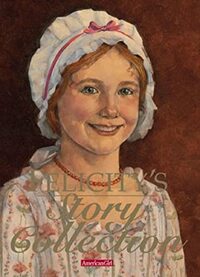Take a photo of a barcode or cover
34 reviews for:
Felicity's Story Collection With 3 Mini Paper Dolls and 2 Mini Scenes
Valerie Tripp, Dan Andreasen
34 reviews for:
Felicity's Story Collection With 3 Mini Paper Dolls and 2 Mini Scenes
Valerie Tripp, Dan Andreasen
Read these books as a companion to listening to the American Girls podcast.
It's probably been two decades since I read Felicity's stories, but I recently brought my dolls out of storage and have been entertaining myself with making new doll clothes for them.
For inspiration and nostalgia I reread the series for both Felicity and Kirsten and I have to say, I'm really surprised by Felicity's stories. And not in a good way.
On the surface, she's the Colonial doll--it's 1774 and her father has stopped selling tea in his store. And yet, though the Revolutionary War is starting, Felicity hardly seems to notice until the last book, when her best friend's Loyalist father is jailed.
Despite that, Felicity is setup to be the most American on the American dolls because she's a Patriot, independent, spirited, etc. And I am deeply concerned about that, because though it is NEVER outright said, it is HEAVILY IMPLIED that Felicity's family, the Merrimans, are slave owners.
And I certainly do not remember this from when I was ten. I remember the horse plot and Felicity's school lessons and her Christmas story--but what I didn't pick up on was that their two servants, Marcus and Rose, are most likely owned by them.
In the first book we are introduced to Marcus, "the man who helps Mr. Merriman at home and at the store" and the second book introduces Rose. They are both referred to as servants. However, in the "Peek into the Past" portion at the end of Meet Felicity we are explicitly told that Marcus is a slave.
"But not everyone in Williamsburg had fine food, elegant clothing, and beautiful homes. Half the people who lived in the town were African-American slaves, such as Marcus. They were forced to work long and hard for the person who owned them. They got little in return except basic food, clothing, and shelter."
And so Rose, being "the cook and maidservant at the Merrimans" is mostly a slave as well. It's also important to note that neither Marcus or Rose are given last names, nor any lines in any of Felicity's stories.
As if that weren't bad enough, in books three and four we meet Mrs Merriman's father (also note that Mother is never given a first name, where Mr Edward Merriman is) who owns a plantation.
Grandfather, as he is referred to, even takes Felicity on morning horse rides across his land, where they stop and talk to his field hands and overseer "about the weather." In the accompanying illustration all the field hands are black and appear to be picking cotton, while Grandfather sits on his horse talking to the white overseer.
As if to really drive it home that Grandfather is indeed a slaveowner, the "Peek into the Past" for Felicity Saves the Day includes a brief description of plantations:
"In Eastern Virginia where Grandfather lived in the 1770s, grains such as wheat and corn were the major crops. While small farms were usually run by the farmer and his family alone, plantations depended on slaves. Slaves planted, tended, and harvested crops. The owner of a plantation, who was called a planter, might have a few to 100 slaves, depending on the size of his plantation."
To counterpoint all this slavery, Felicity's birthday book introduces us to Isaac Wallace, "a free black a little older than Ben" (the Merriman's apprentice). Isaac has a last name, he's described as a drummer in the militia, he has lines, and helps save the day with Felicity and Ben.
So yeah. Kinda ruined my childhood today.
For inspiration and nostalgia I reread the series for both Felicity and Kirsten and I have to say, I'm really surprised by Felicity's stories. And not in a good way.
On the surface, she's the Colonial doll--it's 1774 and her father has stopped selling tea in his store. And yet, though the Revolutionary War is starting, Felicity hardly seems to notice until the last book, when her best friend's Loyalist father is jailed.
Despite that, Felicity is setup to be the most American on the American dolls because she's a Patriot, independent, spirited, etc. And I am deeply concerned about that, because though it is NEVER outright said, it is HEAVILY IMPLIED that Felicity's family, the Merrimans, are slave owners.
And I certainly do not remember this from when I was ten. I remember the horse plot and Felicity's school lessons and her Christmas story--but what I didn't pick up on was that their two servants, Marcus and Rose, are most likely owned by them.
In the first book we are introduced to Marcus, "the man who helps Mr. Merriman at home and at the store" and the second book introduces Rose. They are both referred to as servants. However, in the "Peek into the Past" portion at the end of Meet Felicity we are explicitly told that Marcus is a slave.
"But not everyone in Williamsburg had fine food, elegant clothing, and beautiful homes. Half the people who lived in the town were African-American slaves, such as Marcus. They were forced to work long and hard for the person who owned them. They got little in return except basic food, clothing, and shelter."
And so Rose, being "the cook and maidservant at the Merrimans" is mostly a slave as well. It's also important to note that neither Marcus or Rose are given last names, nor any lines in any of Felicity's stories.
As if that weren't bad enough, in books three and four we meet Mrs Merriman's father (also note that Mother is never given a first name, where Mr Edward Merriman is) who owns a plantation.
Grandfather, as he is referred to, even takes Felicity on morning horse rides across his land, where they stop and talk to his field hands and overseer "about the weather." In the accompanying illustration all the field hands are black and appear to be picking cotton, while Grandfather sits on his horse talking to the white overseer.
As if to really drive it home that Grandfather is indeed a slaveowner, the "Peek into the Past" for Felicity Saves the Day includes a brief description of plantations:
"In Eastern Virginia where Grandfather lived in the 1770s, grains such as wheat and corn were the major crops. While small farms were usually run by the farmer and his family alone, plantations depended on slaves. Slaves planted, tended, and harvested crops. The owner of a plantation, who was called a planter, might have a few to 100 slaves, depending on the size of his plantation."
To counterpoint all this slavery, Felicity's birthday book introduces us to Isaac Wallace, "a free black a little older than Ben" (the Merriman's apprentice). Isaac has a last name, he's described as a drummer in the militia, he has lines, and helps save the day with Felicity and Ben.
So yeah. Kinda ruined my childhood today.
adventurous
informative
inspiring
fast-paced
Felicity: An American Girl by Valerie Tripp - I still love this series! Felicity is the little patriot that makes you want to go read the Declaration of Independence! Happy Reading!
Felicity was my favorite American Girl. I still have my doll safely tucked away.
Felicity was my favorite out of The American Girls Collection because we shared such a similar name. My review is based off my childhood.
Turns out I remember NOTHING about reading these books as a child. Maybe I skipped her?
adventurous
medium-paced
Plot or Character Driven:
A mix
Strong character development:
Yes
Loveable characters:
Yes
Diverse cast of characters:
No
Flaws of characters a main focus:
Yes
Graphic: Animal cruelty
Minor: Slavery
I had a blast reading this -- I don't know what took me so long (I admit I bought my Felicity doll some years ago). I went to school in Williamsburg, at the College of William & Mary, so much of this was a trip down memory lane.
I know these are written on a formula and are meant to sell dolls, but the setting is charming and the history is accurate. I've got the books on Kit, Molly, and Samantha also waiting for my daughter, but this one will have the doll also waiting with it. She's my favorite. Wish they'd make a movie for this one.
I know these are written on a formula and are meant to sell dolls, but the setting is charming and the history is accurate. I've got the books on Kit, Molly, and Samantha also waiting for my daughter, but this one will have the doll also waiting with it. She's my favorite. Wish they'd make a movie for this one.
adventurous
emotional
funny
fast-paced
Plot or Character Driven:
A mix
Strong character development:
Yes
Loveable characters:
Complicated
Diverse cast of characters:
No
Flaws of characters a main focus:
Yes
I was a bit hot and cold on these stories. I really liked Felicity's character growth throughout the books (especially as she starts out particularly strong-headed and selfish), and I enjoyed the material detail throughout. However, I felt that some of the handling of social conditions was problematic (especially as relates to slavery), and I did find a few factual errors that were distracting.
Graphic: Animal cruelty
Moderate: Death, Colonisation
Minor: Alcoholism, Slavery, Blood, Pregnancy, Alcohol, War
While this book isn't explicit about the conditions of slavery in colonial America, the lack of address in this book is quite troubling.





